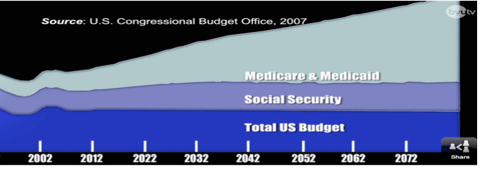The other change to retirement that is creating a windfall for Social Security is the fact that Medicare is also being means tested for Parts B & D. Meaning the more income you earn, the more you will pay for this coverage.
This may be the specific reason why, in 2007, the Congressional Budget Office released the below graph detailing the impact that Medicare/Medicaid, Social Security and the Budget would have on the overall U.S. economy.

See anything in particular? Do you see how Social Security levels off after about 2029, even in the face of the rhetoric that it should ramp up like Medicare and Medicaid?
One possible reason to why this 2007 chart from the CBO depicted Social Security as leveling off in the future and not becoming a burden to the economy might just be due to the fact that 2007 was the first year that Medicare was actually means tested.
It could be just some strange coincidence or it could be that the CBO was really trying to tell us something, which just may be:
1) With the implementation of means testing for Medicare and the rules that state how healthcare is to be serviced, the actual amount that Social Security will be obligated to pay out in benefits verses what is expected to be paid out in benefits will be different by quite a lot.
2) Because of this means testing, the odds of Social Security going broke is low.
With Medicare inflating at 6.5 percent, at the lowest rate reported by the government, and Social Security’s cost of living adjustments (COLA’s) only expected to be at a maximum of 2.8 percent annually for the foreseeable future, it is only a matter of time and simple math to realize that the government’s obligation of providing Social Security benefits will be lowered drastically, all at the expense of those in and heading to retirement.
On the surface, it would appear that the deck is stacked against Social Security, but due to these simple rule changes, the end is most likely not as near as the media would like to report it is, and judging by what the CBO actually told us back in 2007, the end is probably nowhere in sight too.








